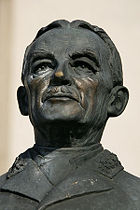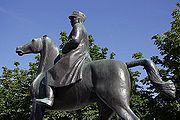
Henri Guisan
Encyclopedia

Switzerland
Switzerland name of one of the Swiss cantons. ; ; ; or ), in its full name the Swiss Confederation , is a federal republic consisting of 26 cantons, with Bern as the seat of the federal authorities. The country is situated in Western Europe,Or Central Europe depending on the definition....
army officer, and held the office of the General
General (Switzerland)
The General is an office and rank in the armed forces of Switzerland. It is held by the commander-in-chief of the Army in time of war only. Under the Swiss Constitution, he must be elected by the Federal Assembly, assembled as the United Federal Assembly, specifically for the purpose of taking...
of the Swiss Army during World War II
World War II
World War II, or the Second World War , was a global conflict lasting from 1939 to 1945, involving most of the world's nations—including all of the great powers—eventually forming two opposing military alliances: the Allies and the Axis...
. He was the fourth and the most recent man to be appointed to the rarely used Swiss rank of General
General (Switzerland)
The General is an office and rank in the armed forces of Switzerland. It is held by the commander-in-chief of the Army in time of war only. Under the Swiss Constitution, he must be elected by the Federal Assembly, assembled as the United Federal Assembly, specifically for the purpose of taking...
, and was possibly Switzerland's most famous soldier. He is best remembered for effectively mobilizing the Swiss army and Swiss people in order to prepare resistance against a possible invasion
Operation Tannenbaum
Operation Tannenbaum , known earlier as Operation Green, was a planned but cancelled invasion of Switzerland by Nazi Germany during World War II.-Background:...
by Nazi Germany
Nazi Germany
Nazi Germany , also known as the Third Reich , but officially called German Reich from 1933 to 1943 and Greater German Reich from 26 June 1943 onward, is the name commonly used to refer to the state of Germany from 1933 to 1945, when it was a totalitarian dictatorship ruled by...
in 1940.
Family and career

Mézières, Vaud
Mézières is a municipality in the district of Lavaux-Oron in the canton of Vaud in Switzerland.-Geography:Mézières has an area, , of . Of this area, or 61.2% is used for agricultural purposes, while or 23.3% is forested...
, in the canton of Vaud
Vaud
Vaud is one of the 26 cantons of Switzerland and is located in Romandy, the French-speaking southwestern part of the country. The capital is Lausanne. The name of the Canton in Switzerland's other languages are Vaud in Italian , Waadt in German , and Vad in Romansh.-History:Along the lakes,...
, a Protestant
Protestantism
Protestantism is one of the three major groupings within Christianity. It is a movement that began in Germany in the early 16th century as a reaction against medieval Roman Catholic doctrines and practices, especially in regards to salvation, justification, and ecclesiology.The doctrines of the...
part of French-speaking Switzerland
Switzerland
Switzerland name of one of the Swiss cantons. ; ; ; or ), in its full name the Swiss Confederation , is a federal republic consisting of 26 cantons, with Bern as the seat of the federal authorities. The country is situated in Western Europe,Or Central Europe depending on the definition....
. He was the descendant of Huguenot
Huguenot
The Huguenots were members of the Protestant Reformed Church of France during the 16th and 17th centuries. Since the 17th century, people who formerly would have been called Huguenots have instead simply been called French Protestants, a title suggested by their German co-religionists, the...
Protestants who emigrated from France in 1685. He attended school in Lausanne
Lausanne
Lausanne is a city in Romandy, the French-speaking part of Switzerland, and is the capital of the canton of Vaud. The seat of the district of Lausanne, the city is situated on the shores of Lake Geneva . It faces the French town of Évian-les-Bains, with the Jura mountains to its north-west...
, and initially studied agricultural medicine. Upon entering the Swiss military in 1894, he was assigned to a horse-drawn artillery unit in Biere as a Lieutenant. He was promoted several times, reaching the rank of Colonel in 1920.
Defence of the nation

General (Switzerland)
The General is an office and rank in the armed forces of Switzerland. It is held by the commander-in-chief of the Army in time of war only. Under the Swiss Constitution, he must be elected by the Federal Assembly, assembled as the United Federal Assembly, specifically for the purpose of taking...
: a unique rank chosen only in time of war or national emergency. On 30 August 1939, Guisan was elected as General, by 204 votes to 21 for Jules Borel. He was given the directive to safeguard the independence of the country and to maintain the integrity of the Swiss territory. In 1939 the Swiss military could muster 430,000 troops, approximately 20% of the work force. However, Swiss military equipment was not on a par with that of the German military.
Guisan's appointment came despite his membership in the Fédération patriotique suisse
Schweizerischer Vaterländischer Verband
Schweizerischer Vaterländischer Verband was a right wing organisation influential in Swiss politics before World War II.The SVV was set up in 1918 by Dr...
, a largely pro-Nazi organisation. However, his command was dominated by conflict with the government, who thought him to be too pro-French
France
The French Republic , The French Republic , The French Republic , (commonly known as France , is a unitary semi-presidential republic in Western Europe with several overseas territories and islands located on other continents and in the Indian, Pacific, and Atlantic oceans. Metropolitan France...
. Whereas the government preferred an understated neutrality, Guisan opted to call for determined resistance. After the Battle of France
Battle of France
In the Second World War, the Battle of France was the German invasion of France and the Low Countries, beginning on 10 May 1940, which ended the Phoney War. The battle consisted of two main operations. In the first, Fall Gelb , German armoured units pushed through the Ardennes, to cut off and...
, Germany found documents proving that Guisan had been secretly making military preparations with France, despite Swiss neutrality.
On 25 July 1940, General Guisan delivered a historic address to the entire Swiss Officer Corps assembled on the Rütli, a location charged with symbolism in Swiss Romantic nationalism by virtue of being identified as the site of the Rütlischwur
Rütlischwur
The Rütlischwur is a legendary oath of the Old Swiss Confederacy, taken on the Rütli, a meadow above Lake Lucerne near Seelisberg. The oath is notably featured in the Wilhelm Tell drama of 1804 by Friedrich Schiller.-Early accounts:...
of 1291. Guisan became a symbol of resistance to Nazism that was widespread amongst the Swiss public.
He made it very clear that Switzerland would resist any Nazi invasion. If they ran out of bullets they were to resort to the bayonet. He said that Switzerland would defend itself against any invader and would never surrender. The Swiss government had a decentralised structure, so even the Federal President was a relatively powerless official with no authority to surrender the country. Indeed, Swiss citizens had been instructed to regard any surrender broadcast as enemy lies and resist to the end.
As a consequence, General Guisan developed his famous "Reduit
Reduit
A reduit is a fortified structure such as a citadel or a keep into which the defending troops can retreat when the outer defences are breached...
Concept" in summer 1940, according to which the Swiss Army would have retreated into the Alps
Alps
The Alps is one of the great mountain range systems of Europe, stretching from Austria and Slovenia in the east through Italy, Switzerland, Liechtenstein and Germany to France in the west....
relatively soon if attacked, but would have kept up resistance based on some sort of guerrilla
Guerrilla warfare
Guerrilla warfare is a form of irregular warfare and refers to conflicts in which a small group of combatants including, but not limited to, armed civilians use military tactics, such as ambushes, sabotage, raids, the element of surprise, and extraordinary mobility to harass a larger and...
and stay-behind
Stay-behind
In a stay-behind operation, a country places secret operatives or organisations in its own territory, for use in the event that the territory is overrun by an enemy. If this occurs, the operatives would then form the basis of a resistance movement, or would act as spies from behind enemy lines...
tactics from there. The Swiss paramilitary organization Aktion Nationaler Widerstand (Resistant National Action), formed from contacts between selected army figures and conservative civilian circles, had the explicit task to persuade the civilian population to resist invaders.
The main strategy, however, was deterrence rather than fighting. Even though tiny Switzerland had an army of only 430,000 men, Germany never risked invasion. On 20 August 1945, General Guisan left his command, considering his mission to be fulfilled.
He died on 7 April 1960. Asteroid 1960 Guisan
1960 Guisan
1960 Guisan is a main-belt asteroid discovered on October 25, 1973 by Wild, P. at Zimmerwald Observatory. It is named after Swiss general Henri Guisan.- External links :*...
has been named in his honour. A road in the city of Lausanne
Lausanne
Lausanne is a city in Romandy, the French-speaking part of Switzerland, and is the capital of the canton of Vaud. The seat of the district of Lausanne, the city is situated on the shores of Lake Geneva . It faces the French town of Évian-les-Bains, with the Jura mountains to its north-west...
was re-named 'Avenue du General Guisan', a rare event in Switzerland.
External links
- Centre Général Guisan -- Biography and bibliography, in French and German.
- Complete genealogy of the Général Guisan on the Geneva Genealogy Society web site

